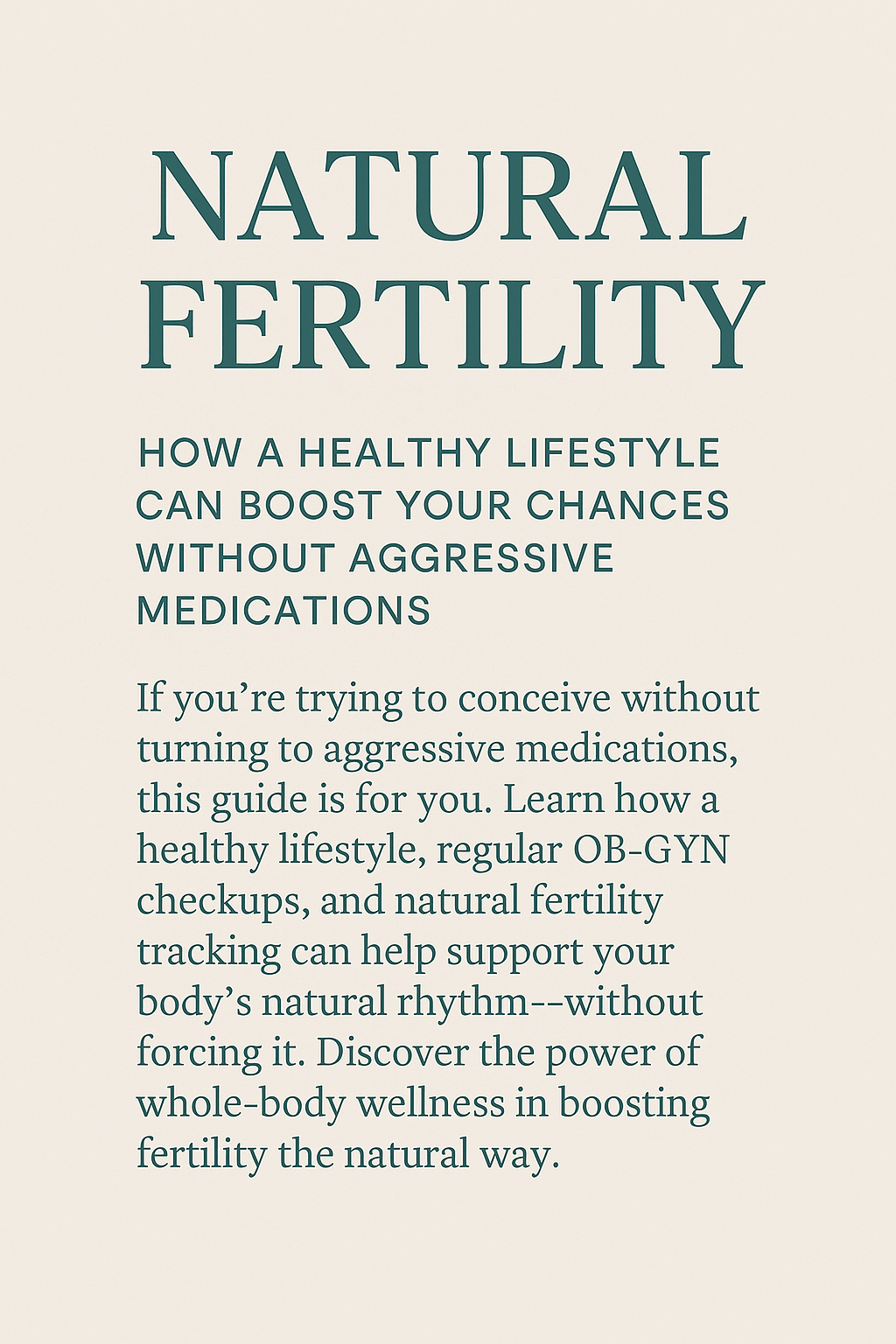
Natural Fertility: How a Healthy Lifestyle Can Boost Your Chances Without Aggressive Medications
Share
Introduction
Fertility is a deeply personal journey, and for many women, the pressure to conceive quickly can lead to the use of aggressive fertility treatments. However, more women today are embracing a natural, holistic approach to fertility, focusing on nourishing their bodies and minds rather than forcing conception through invasive medications.
If you're wondering how to get pregnant without harsh drugs or treatments, this guide will walk you through a health-conscious fertility journey—centered around balance, lifestyle, and expert support.
Why Avoid Aggressive Fertility Medications?
Medications like Clomid, Letrozole, or injectable hormones can help some women ovulate, but they also come with risks:
- Mood swings and emotional stress
- Ovarian hyperstimulation syndrome (OHSS)
- Multiple pregnancies (twins, triplets, or more)
- Hormonal imbalances that can disrupt long-term reproductive health
For women with mild fertility issues—or none at all—jumping into medical intervention too early may disrupt the body’s natural rhythm and cause more harm than good.
Listen to Your Body First
Rather than using medication to force your body to ovulate or conceive, it's essential to understand and support your body’s natural reproductive cycles.
Here’s how:
1. Track Your Menstrual Cycle
Use apps or a journal to monitor:
- Ovulation windows
- Cycle regularity
- PMS symptoms
- Cervical mucus patterns
Understanding your cycle empowers you to identify peak fertility days without synthetic triggers.
2. Schedule Regular OB-GYN or Fertility Check-Ups
Early and regular visits with your OB-GYN or fertility specialist can help you:
- Identify potential issues early (like PCOS or endometriosis)
- Understand hormone levels naturally
- Get personalized insights based on your health history
This proactive approach helps you stay informed without relying on trial-and-error medications.
Important Medical Considerations Before Trying to Conceive Naturally
Even if you’re pursuing a non-invasive path, there are crucial medical steps that can set the stage for a successful and natural conception:
1. Comprehensive Blood Work
Your doctor can check:
- Thyroid hormones (TSH, T3, T4)
- Ovarian reserve via AMH (Anti-Müllerian Hormone)
- Estrogen, progesterone, FSH, LH, testosterone
- Vitamin D, iron, and B12 levels
- Blood glucose and insulin sensitivity
- Inflammation markers (CRP, etc.)
This lab work gives a clear picture of your hormonal balance and fertility readiness.
2. Find the Right Fertility-Friendly Doctor
Not all providers are equal. Look for a doctor or fertility specialist who:
- Is open to a natural or integrative fertility path
- Offers cycle monitoring, not just prescriptions
- Values holistic assessments over fast-track interventions
- Encourages informed decision-making and collaboration
If you don’t feel heard, keep searching. The right provider will support your vision.
3. Pelvic Exam & Ultrasound
A baseline ultrasound can assess:
- Uterine health and endometrial lining
- Presence of fibroids, cysts, or blockages
- Ovarian activity
This is especially helpful if you’ve experienced irregular periods, pain, or prior miscarriages.
4. Partner Fertility Testing
Fertility is not just a women’s issue. A semen analysis can check for:
- Sperm count
- Motility
- Morphology
If you’ve been trying for 6–12 months without success, testing your partner is a critical next step.
Natural Ways to Boost Fertility
Small lifestyle changes can significantly impact your fertility without needing medication. Here's how to prime your body for conception the natural way:
1. Eat Fertility-Boosting Foods
A fertility-friendly diet should be rich in:
- Leafy greens, berries, and whole grains (for antioxidants and fiber)
- Healthy fats like avocado, olive oil, and omega-3s (support hormone production)
- Lean protein (to regulate insulin and reproductive hormones)
Avoid processed sugar, excessive caffeine, and alcohol, which may negatively affect ovulation.
2. Maintain a Healthy Weight
Both underweight and overweight women may experience hormonal imbalances. A balanced BMI (18.5–24.9) supports regular ovulation and increases your chances of conceiving.
3. Exercise in Moderation
Exercise can reduce stress and balance hormones. Opt for:
- Yoga or Pilates
- Walking or swimming
- Fertility-focused movement routines
Avoid overtraining, which can suppress ovulation.
4. Reduce Stress and Prioritize Sleep
Stress can lead to hormonal disruptions. Incorporate:
- Meditation
- Journaling
- Deep breathing techniques
- 7–9 hours of quality sleep nightly
Lower cortisol = better fertility outcomes.
5. Cut Out Endocrine Disruptors
Avoid chemicals found in plastics, skincare, and household cleaners. These disrupt your hormones and fertility. Switch to:
- BPA-free products
- Organic personal care items
- Natural cleaning supplies
Wearing gloves when using harsh chemicals is essential to protect your skin from burns, irritation, and harmful absorption.
Partner Health Also Matters
Fertility is a two-person journey. Encourage your partner to:
- Eat a clean diet
- Avoid tobacco, alcohol, and excessive heat (like hot tubs)
- Get a semen analysis if trying for 6–12 months without success
When to Consider Medical Support
Natural methods are highly effective for many, but there are times when medical intervention may be necessary. You may want to consult a specialist if:
- You’ve been trying for over a year (or 6 months if over age 35)
- You have known reproductive conditions
- Your cycles are irregular or absent
A good fertility specialist will prioritize your health, offering step-by-step solutions that align with your preferences and values.
Final Thoughts: Trust the Process, Not the Pressure
You don’t need to force your body to conceive. Fertility is a journey, not a race. By tuning into your body, making healthier choices, and working with a provider who respects your goals, you create space for conception to happen naturally—on your terms.
